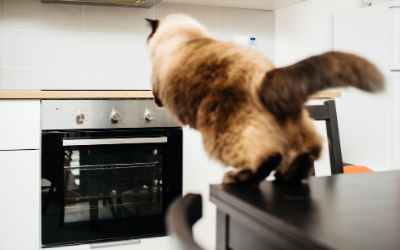As cat owners, we all know that cats are skilled at landing on their feet, but that doesn’t mean they are immune to injuries when they fall. It’s important for cat owners to be aware of the potential problems that can arise from a feline taking a tumble. In this article, we will discuss the signs to watch for after a fall, what to do in case of a fall, and how to prevent your cat from falling.
Signs to Watch for After a Fall
If you witness your cat falling, it’s crucial to observe them carefully for a couple of days. While some injuries may be immediately obvious, others may take a few hours or even days to become apparent. Even if you didn’t witness the fall, there are certain signs you should look out for. These signs include:
- Reluctance to stand or walk
- Pain upon lying down or rising
- Stiff gait
- Limping
- Difficulty breathing
- Whining
- Lethargy
- Decreased appetite or difficulty eating
What to Do in Case of a Fall
If your cat has sustained a serious injury from a fall, it’s important to seek immediate evaluation and treatment from a veterinarian. However, there are some first aid steps you can take at home while preparing to take your cat to the veterinary hospital. Here are a few steps you can follow:
Monitor breathing: If your cat is struggling to breathe, it’s crucial to transport them to the nearest emergency hospital. Cats are “nose breathers,” so panting is a sign of respiratory distress. When transporting a cat with respiratory problems, handle them carefully and support them behind the front legs and in front of the back legs. If your cat stops breathing, you can assist respiration by blowing air into their nose.
Protect open wounds: If the skin was broken during the fall, cover the area with a clean towel to minimize contamination. Cover any wounds with broken bones protruding from them as bone infections can complicate healing.
Control bleeding: If the wound is bleeding, apply gentle but firm pressure with a towel wrapped tightly around the injured site. If excessive bleeding occurs, prompt emergency care is vital.
Look for head injuries: Blood in the eyes, nose, or mouth may indicate a head injury. Proceed to your veterinary hospital if you notice these signs.
Be aware of back injuries: If your cat can’t get up at all, they may have sustained a back injury. Keep them as still as possible by gently placing them on a rigid object like a baking sheet and seek emergency help.
Monitor your cat for several days: Even if your cat appears normal after a fall, it’s important to monitor them closely for a few days. Delayed injuries, such as collapsed lungs or hernias, can occur and require prompt attention.
Monitor eating and elimination: Watch your cat eat and drink to ensure they are not experiencing any issues. If they have difficulty eating or drool excessively, consult your veterinarian. Additionally, monitor their eliminations as a lack of normal bowel movements or urination can be a sign of something serious.
How to Prevent Your Cat from Falling
Cats are natural climbers, making it challenging to prevent them from jumping on sofas or countertops. However, as responsible cat owners, we should always be prepared for unexpected situations. Here are a few tips to help prevent your cat from falling:
- Secure windows and balconies with sturdy screens or barriers to prevent your cat from accidentally falling.
- Provide your cat with plenty of vertical spaces indoors, such as cat trees or shelves, to satisfy their climbing instincts.
- Keep countertops and tables clear of objects that may entice your cat to jump up.
- Regularly trim your cat’s nails to minimize the risk of slipping on surfaces.
- Supervise your cat when they are exploring elevated areas, such as bookshelves or window sills.
By taking these preventive measures, you can reduce the risk of your cat sustaining injuries from falling and ensure their safety and well-being.
Frequently Asked Questions
Q: Can cats injure themselves from falling from any height?
A: Cats are known for their ability to land on their feet, but falls from great heights can still lead to injuries. Cats have a greater chance of survival when falling from higher heights due to their ability to spread their body out and slow their descent.
Q: How high can cats fall from without getting injured?
A: Cats have been known to survive falls from great heights, such as tall buildings or trees. Their flexible bodies and reflexes allow them to land safely. However, it’s important to note that falls from any height can still result in injuries.
Q: Should I always take my cat to the veterinarian after a fall?
A: It’s essential to monitor your cat closely after a fall and seek veterinary care if you notice any signs of injury or abnormal behavior. While some falls may result in minor injuries that can be treated at home, it’s always best to consult with a veterinarian for a proper evaluation.
Conclusion
While cats are known for their agility and ability to land on their feet, they are not invincible to injuries from falls. As cat owners, it’s crucial to be aware of the signs to watch for after a fall, take appropriate first aid measures, and seek veterinary care when necessary. By following these guidelines and implementing preventive measures, you can help ensure the safety and well-being of your feline companion.
For more information and pet care tips, visit Pawsoha.

